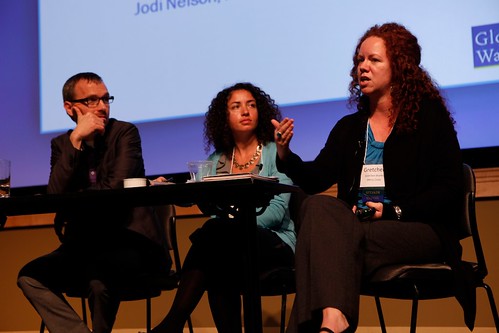The panel discussion focused on the growing pressure in the development sector for effective monitoring and evaluation in measuring the successful impact of of programs from aid and relief work to development. Much of impact evaluation often doesn’t take into account the various challenges that successful implementation of programs face on the ground and the panel discussed the challenges as well as some best practices for large and small organizations to move forward with useful evaluation methods.
Moderator Jodi Nelson, of the Bill & Melinda Gates Foundation, opened the panel with a quote pulled from a recent news article asking, “how do we ask the do gooders to prove they really do good,” which underscores the growing need and desire to hold non-profits, NGOs, and aid programs accountable to their goals and good intentions. In the past, NGOs were thought to be exempt from traditional oversight, Nelson explained. “Intention alone was considered enough proof to prove they were accomplishing their goals.”
After fielding many questions from the audience, the panel took turns in the informal discussion. Holta Trandafili, of World Vision International, discussed the shift towards applying lessons learned in the past decades and how impact evaluation can help tailor future programs for more effective implementation and greater impact. There was some question in the audience about whether evaluation was important for small organizations, which Trandafili affirmed and emphasized the need to define the type of evaluation for each organization. She explained that it’s important for small organizations to focus on asking the questions, “can we actually measure our impact and when we do, what are we going to do with what we find?” Gretchen Shanks, from Mercy Corps, added that monitoring may be more efficient for short term programs like relief and crisis programs, while long term programs really do require more evaluation to stay in line with their missions and consistently respond to the data for improvement. One of the ways that Mercy Corps champions this is by looking at the “theory of change” that is motivating their programs. While there is not one set of tools that is ideal for community mobilization in these programs, continuous resource allocation, building in participatory channels for the communities that are being served, and monitoring processes are key.
Innovation was also discussed by the panelists. Many times, the funding environment for non-profits and NGOs does not create space for failure. The environment is competitive and the structure of funding and project cycles disincentivizes monitoring and evaluation. Shanks expressed, “we feel like we can’t talk about failure openly,” which makes innovation difficult. Nigel Biggar, of Grameen Foundation, shared that successful innovation will come when experimental programs require less cost and time to be evaluated. Doing so will enable ineffective programs to fail quickly without much cost, “so we can learn and build on those quickly,” and lead the way for more innovation.
Submitted by Nina Carduner
